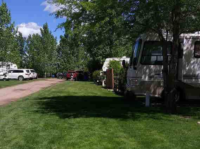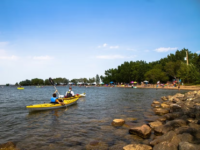City open house sheds light on proposed land use bylaw changes
By Al Beeber - Lethbridge Herald on November 22, 2023.
LETHBRIDGE HERALDabeeber@lethbridgeherald.com
An open house at Casa recently gave Lethbridge residents their first look at proposed changes to social uses in the city land use bylaw which is undergoing a total rewrite.
The City of Lethbridge has launched a three-year project to create a new land use bylaw.
While the bylaw has been tweaked over the decades it hasn’t undergone a major overhaul since it was created in 1986.
Senior planner and co-project lead Ross Kilgour recently told the Southern Alberta Council on Public Affairs the project is an opportunity to rebuild the land use bylaw to shape the kind of communities in which Lethbridge residents want to live, visit and do business.
Kilgour at the open house said the City has prepared draft recommendations for social uses. Each board set up around the community room showed what the City is proposing to change and what existing definitions are.
“There are changes to some of the definitions of the social uses and for some of them where they’re allowed so which land use districts (they’re) allowed in – whether they’re discretionary or permitted uses,” said Kilgour.
The City was hoping to get as much input from the public as possible. The new definitions have been published on the project website, as well.
Kilgour said engagement this year has shown that there is among the public a recognition things need to change.
“The status quo isn’t something that people are happy with, with all the issues we’ve got,” added Kilgour.
A definition has been set up for supervised consumption site, which isn’t contained in the present bylaw.
Kilgour said the City’s experience with the SCS was that it doesn’t “fit within other types of use so what we’re proposing is creating a specific definition for it and making it very clear where it’s allowed and where it’s not allowed. We’re proposing a 150-metre buffer around parks and schools where you wouldn’t be able to have an SCS or a shelter,” said Kilgour.
“We think hopefully that will give people a lot more certainty in the future,” Kilgour added.
The only buffer that currently exists is for retail stores around schools and parks.
The proposed definition in the new land use bylaw for “supervised consumption site” will be a “development that provides supervised consumption services for illicit or legal substances in accordance with federal and provincial requirements.” Under the new bylaw, SCS facilities would only be considered for discretionary use in the P-B (Public Building) land use district.
There will be no change to the definition of shelter which means a “development providing emergency overnight accommodation that may include kitchen and dining facilities, showers and bathrooms, relaxation areas and laundry facilities. Accommodation for resident staff may be incorporated as an accessory use.”
Shelters would be allowed in Business Industrial land use districts – where they are currently disallowed and in Public Building LADs where they are now allowed for discretionary use. They would also be allowed as a discretionary use under future urban development.
Drop-in centres and resources centres would be changed to community hubs, the definition of which would be a “development that provides daytime community space, activities and services for the public. This use does not include overnight accommodation. Accessory uses may include retail, restaurants, fitness and recreational facilities.”
Presently, drop-in centres are defined as a development that “provides daytime shelter to people whose wellbeing is at risk. This use does not include overnight accommodation.”
Resource centre means a development “that provides various social services aimed at addressing the special needs of people whose well-being is at risk. This use does not include overnight accommodation.”
Community hubs in a new LUB would be permitted in several districts including downtown commercial, general commercial, highway commercial, neighbourhood commercial, mall commercial, business industrial and public building.
A soup kitchen is currently defined as a development “that provides for the charitable provision of meals, consumed on-site, to people in need.” That current definition also includes one for “restaurant” which is defined as a place where “food and beverages are prepared and served and includes supplementary alcohol beverage service and supplementary on or off-premises catering services and may include supplementary drive-through service….” A new definition for “food service” would include soup kitchen in the definition.
Under the proposal, the definition of “group home” would change to mean a “development using a building for a residential social care facility providing rehabilitative and/or supportive care for four to 10 persons. This use may incorporate accommodation for resident staff as an accessory use.”
Presently, group home is defined as a development “using a dwelling for residential social care facility providing rehabilitative and/or supportive care for four to 10 persons who, by reason of their emotional, mental, social or physical condition require a supervised group living arrangement.” It may also incorporate accommodation for resident staff as an accessory use.
The current definition for “supportive housing” calls this a development “providing accommodation for eight to 25 residents and associated support programs meant to foster self-sufficiency…..”
The new definition would call this a development “providing accommodation for residents and associated support programs and/or medical services, in dedicated spaces, meant to foster residents’ self-sufficiency….”
The LUB proposal calls for supportive housing facilities to be allowed in several land use districts including downtown commercial, where it is now discretionary, highway commercial (not allowed), mall commercial (now not allowed), public building (currently a discretionary use) and mixed density residential (now a discretionary use).
Follow @albeebHerald on Twitter
29-28




